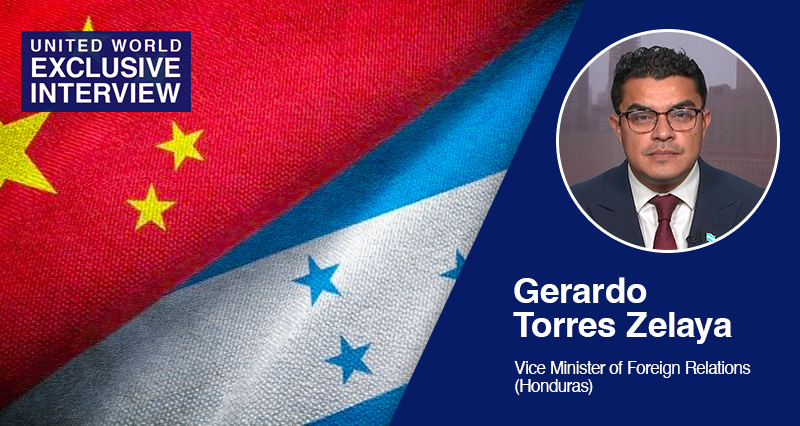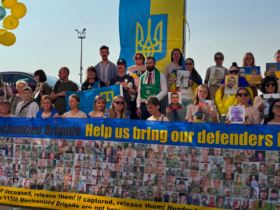On March 26, 2023, Honduras stopped its diplomatic relations with Taiwan and established these formally with the Republic of China. On this decision, I spoke with the Vice Foreign Minister of the Republic of Honduras, Gerardo Torres Zelaya.
What is the broader context of your government’s decision to establish diplomatic relations with the P.R. of China?
Honduras, traditionally and especially after the coup d’etat of 2009 (against then-President Manuel Zelaya, husband of current President Xiomara Castro Zelaya, UWI) had very strong relations with the United States and Spain. In addition to these, our country had also close cooperation with countries such as Colombia, Taiwan and Israel, which were close U.S. allies and played parts in Washington’s strategies in different regions of the world.
Orientation to a more multilateral foreign policy
This was a very narrow foreign policy. Xiomara Castro detected that with this policy and the coup of 2009, the “world’s doors were closed” to Honduras. She promised to re-open these doors.
Already in her election campaign, she presented a government plan with a concrete promise to establish relations with the People’s Republic of China. This promise has now been fulfilled and is part of a general orientation towards a more multilateral foreign policy.
Opening relations with China is important in many aspects: Access to new markets, reducing historical dependencies, creating and expanding opportunities for businesspeople, access to other cultures, technology and research.
What is your expectation for future relations with Taiwan?
This is not a move against Taiwan. We appreciate very much what Taiwan has done for Honduras. They are engaged in very important projects of technology, agriculture and education.
But due to the One-China-only-policy, it was not possible to maintain diplomatic relations with them in parallel to those established with China. Besides, our sovereign decision came as no surprise to them.
Now we have to see how the existing economic cooperation with Taiwan can be continued. We have important exports to Taiwan. Taiwan is part of the Central American bank, which has an office there. Honduras is currently presiding over the bank.
Therefore, we do not want bad relations with Taiwan. But I also want to mention that the Honduran population welcomed very much the decision to establish relations with China.
What are your expectations from this newly established relations with China?
Until today, Honduras had mainly bilateral commercial ties focused on the United States and some European countries. Over the last 100 years, these relations benefitted only small circles in society.
For a country that is fighting poverty and is struggling for well-paid jobs, economic development is hard to achieve if you do not have access to other markets.
Now China proposes its allies the Belt and Road Initiative and the realization of important infrastructure projects. These projects together with market access will be an important incentive for development.
China is also a globally leading country when it comes to innovation, science, technology and academic research. Honduras wants access to all that.
What was the concrete context that has led Honduras to take this decision?
First of all, I must mention that 75% of the Honduran population lives below the poverty line. That leads to strong emigration, where people look for other opportunities in other countries. People literally walk 6.000 kilometers to the United States because of the desperate situation they are living in.
Here, global and local current inflation, rising also due to the war in Ukraine, has great effect. The increase of the price of oil or fertilizers affects production directly and heavily. Hence, Honduras needs to find a way to produce sufficient alimentation to satisfy the food needs of the population.
Secondly, we are a highly indebted country. In 2009, we had a debt of 5 billion US dollars, accumulated over the last 100 years. But today, our debt has reached 20 billion dollars. Half of our state budget goes to debt service, leaving very few resources for infrastructure, investment and satisfaction of popular needs. Therefore, we need alternatives to pay the debt without having a crisis in governability.
Thirdly: We do not produce any greenhouse gases, but we are one of the world’s most vulnerable in regard to climate change. We need to have infrastructure, projects, and strategies to withstand the effects of climate change, without reducing economic capacity.
In summary: We think that when it comes to access to new markets, fighting inflation, fighting debt crisis and answering challenges of climate change, China is one of the strongest and most important allies in the world.
How did the United States react to your government’s decision?
Until now, we have not received any official reaction from the United States. As I said, this is a sovereign decision of Honduras. U.S. officials asked us though questions – similar to the ones in this interview.
Our government has been very transparent and open in regards to establishing a new relation with China.
Honduras has had traditional and strong relations with the United States, which we hope to continue in order to attract investment to our country and cooperate against transnational crime networks in narcotics. Tackling migration and supporting democracy region wide also remain on our bilateral agenda.
In January, we have had an important bilateral governmental meeting with the United States and I hope that things won’t change, Honduras maintaining its relationship with the United States and developing a new one with the People’s Republic of China.

















Leave a Reply